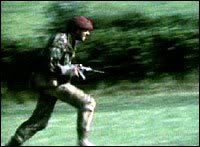A.F.N. Clarke, "Contact"

"Contact", written by A.F.N. Clarke and published in 1983, was an obyvatel account of his two tours of Northern Ireland, in Belfast in 1973 and South Armagh in 1976, as a Captain in the Parachute Regiment. Written as an unmediated soldier’s account, it offered a harsh and unforgiving verdict on all sides participating in "The Troubles".
The book depicts the soldiers of the British Army living a strange dual existence, between isolation in dark, improvised urban fortresses, forever trying to fend off boredom or to simply catch up on sleep, and their release onto the streets, where their tensions and frustrations are released in bone-crunching episodes of violence, as local youths are pushed up against walls to have their balls squeezed, pubs are turned over and their contents smashed, and rioting mobs are steamed into with armoured personnel carriers. The "toms" live in fear of, and enthusiasm for, "contact" with the enemy, be it the ruthless I.R.A professionals of the border counties, or the slippery, cunning "loyalists" of the U.D.A.
"Contact" depicts the war in Ulster not as one of territory, or religion, or ideology, but as a war to control the narrative. In such a fissile environment, with the aggressors living cheek-by-jowl, incidents are depicted as inevitable, even when the Paras are not deliberately trying to stoke them up. What matters to all sides is not what happens, but how it is interpreted by the outside world. Clarke paints a portrait of a ghost war, where major riots are forgotten almost as soon as they have ended, where casualties are hushed up, and where the perpetrators of an act of violence can change between news bulletins. Indeed, part of what allows the soldiers to get away with their violent harassment is that they know that there are many situations where it suits the paramilitaries to keep quiet about Army incursions onto their territory.
A year later, in 1984, "Contact" was adapted for television by Alan Clarke on behalf of the BBC. Clarke was always the most cold-eyed and unsentimental of the social realists, and he abstracted the story even further. Concentrating on the second half of the book, he depicted the Paras in South Armagh almost as a wandering tribe, endlessly patrolling the hills around Crossmaglen, observing the ambivalent comings and goings on the local farms carefully but remotely. Like the mercenaries in "Predator", the soldiers are always watching, always being watched, their lives an exercise in unending low-level tension. That is until we see just how lethal the border country can be.
"Contact" was much criticised at the time, for its refusal to moralise, to offer "solutions", or to make an obvious statement. Not one to take criticism lying down, when Clarke was to return to the subject of The Troubles five years later, it was with the most pared-down and brutal 40 minutes of drama that British television had ever seen, and is ever likely to see.
No comments:
Post a Comment